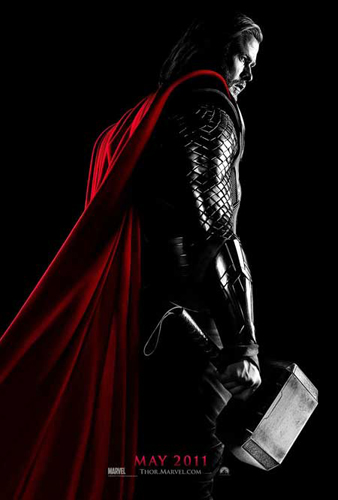Not 'Thor' nothing

British actor and director Kenneth Branagh is perhaps best known for his stage and screen adaptations of Shakespeare, including Henry V (1989), Much Ado About Nothing (1993) and Hamlet (1996), as well as a range of other Hollywood roles, from the self-directed Dead Again (1991) to Harry Potter and the Chamber of Secrets (2002).
Despite a reputation for versatility, that has included villainous turns in mainstream comedies such as Wild Wild West (1999) and The Boat That Rocked (2009), however, many still expressed surprise at the choice of Branagh to direct hotly-anticipated comic book movie Thor, also starring Natalie Portman and Anthony Hopkins, which makes its US debut on Friday and opens in the Chinese mainland Sunday.
Branagh, 50, spoke about why he was drawn to the project and the pressures of working on a big-budget Hollywood movie.
Q: What possessed you to direct Thor?
A: The surprise of it was a big factor. Its immensity, the degree of difficulty, which I thought would be massive [and because] the challenge would take me out of my comfort zone... This immense figure in epic landscapes and mountains, men with horned helmets and this wild, unpredictable quality, which I loved because superheroes can sometimes be terribly smooth. The fact that Thor is a god, and an unrestrained god – that kind of unpredictability and danger, I thought would be unusual and maybe distinctive.
Q: There was a lot of studio interference, a lot of commentary?
A: Let's call it collaboration. They have this unique cinematic plan to interweave these characters and these stories into The Avengers (movie) next year. I knew what I was getting into. The impression I had was they want a strong point of view. They would argue with me and they would strongly produce me... But they wanted a director. They didn't want just a shooter – someone to come in and walk away and leave it to them.
Q: They wanted to make sure it made money – it being a $150 million budget and all?
A: Yes and no. Without remotely diminishing the vast chunk of change that is, I had almost no control over that... I kept my focus very narrow and in the end, I don't know what the toys look like, I didn't have any say in that. I don't know about the commercial tie-ins, who paid what for what. I had plenty to do, just start with what's on the page and then how we realize a single story.
Q: One of the challenges which you might have faced was how to make this Norse god stand above the fray because there have been a dozen superhero franchises before.
A: Already it stands apart because, as Stan Lee put it when he started writing about it, he'd gone as far as he could with humans.
Now he wanted to use gods... Here we have a superhero with those powers, a god indeed, who has to lose everything and engage with our audience. Really, the key is having him lose everything... enjoy going on the journey with him – him getting his comeuppance, him losing everything in order to understand what he's worth, family, friends, home.
Q: So would you do it again? Would you direct a massive, big-budget, 3D, effects-laden summer popcorn flick?
A: It didn't seem as big right at the start. It got bigger the further I got into the woods... At this end of things, I must note somehow I've got to stop for a little bit and have a think and process it all... That's the point at which I'm at.
That question [of doing another] – if it arises, and it hasn't arisen yet – because as thrilled as we are with the way it seems to be going now, it will be a few weeks before we understand the financial and creative fate of the move. There are a thousand tales to tell, we'll wait and see.
 0
0 







Go to Forum >>0 Comments